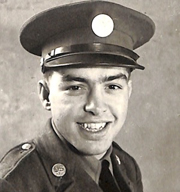First Local Youth Home from African War Scene
First Webster City man home from the North African campaign is Pfc. Harold Wilson (sic Willson), son of Mr. and Mrs. George A. Wilson (sic Willson), 1036 Water street. Injured in training camp after the Axis was driven out of Africa, Wilson was invalided home, making the trip in ten days, and is now stationed at a hospital in Texas. He is home on leave, and will return to the hospital Tuesday.
Wilson left Webster City in February, 1941, to begin training. In Africa it was the duty of the Webster City boy to help move men and supplies from landing bases and supply depots up to replacement centers or front line posts.
Saw Action
While he did not get into the actual fighting he was near enough to be in danger most of the time, and he could see fighting at a distance.
“Of course we were scared the first time we went up,” Wilson says. “Everybody is scared, right at first. But all the fellows seem to get to feeling the same way: They don’t care one way or another, they just want to tear in and get it over with. That makes it hard for the officers, who have to keep them controlled.
Dive Bombers
“I was driving a truck from the landing base to a replacement center, hauling new troops up to be sent in where they were needed, and we were dive bombed plenty on the road. When you see an enemy plane coming you stop the truck and everybody dives for the ditch, and believe me, it doesn’t take long.
“Dive bombers are tough to face,” Wilson continued. “It seems like they’re coming right straight for you alone. We saw a couple of bombers that never came out of the dive, just crashed on into the earth. One night we were bombed eight times, lost 26 trucks, but not a man. When we reached the replacement center we would leave our trucks there and all would pile into one or two other trucks and go back after another load.
Fine First Aid
“On the road we saw hundreds of dead, mostly Germans and Italians, but a few of our own me. The wounded were all picked up right away, and we lost very few wounded men because of the wonderful work of the first aid men.
“For my money, that first aid gang has the toughest job in the whole army,” Wilson declared. “They’re out after wounded while the bullets are still flying, and believe me, the enemy shows ‘em no mercy. Seems like they’d rather kill first aid men than infantry men. The whole unit of one outfit was wiped out.”
The three Webster City boys who were lost, Wilson and Evans as prisoners and Harris missing, were with the group that bore the brunt of the break-through at Kasserline Pass, Wilson said.
“They had orders to hold while a new defense line was set up 15 miles back,” Wilson said. “And they did it, although most of the outfit was killed or captured. We were bringing up supplies and men to the new line, and everything worked smoothly, although everyone knew the Germans were due to break through.”
African Ribbon
After the campaign the boys still went through drills at camp, and it was at one of these that Wilson was injured by a rifle butt in bayonet practice. He will be hospitalized for two or three months. His North African ribbon is red, white and blue in the center, and carries also the colors of green for France, black for Germany and brown for Italy, all countries faced in battle. But—
“I want to get back,” Wilson says. I’m homesick for the boys, and I don’t want the gang to go away without me!”
Source: Daily Freeman Journal, Webster City, IA – June 2, 1943
![]()
Harold Darris Willson was born Jan. 23, 1921 to George A. and Marie Lovelace Willson.
Pvt. Willson served with the Army Air Corps in World War II.
Sources: ancestry.com
![]()

